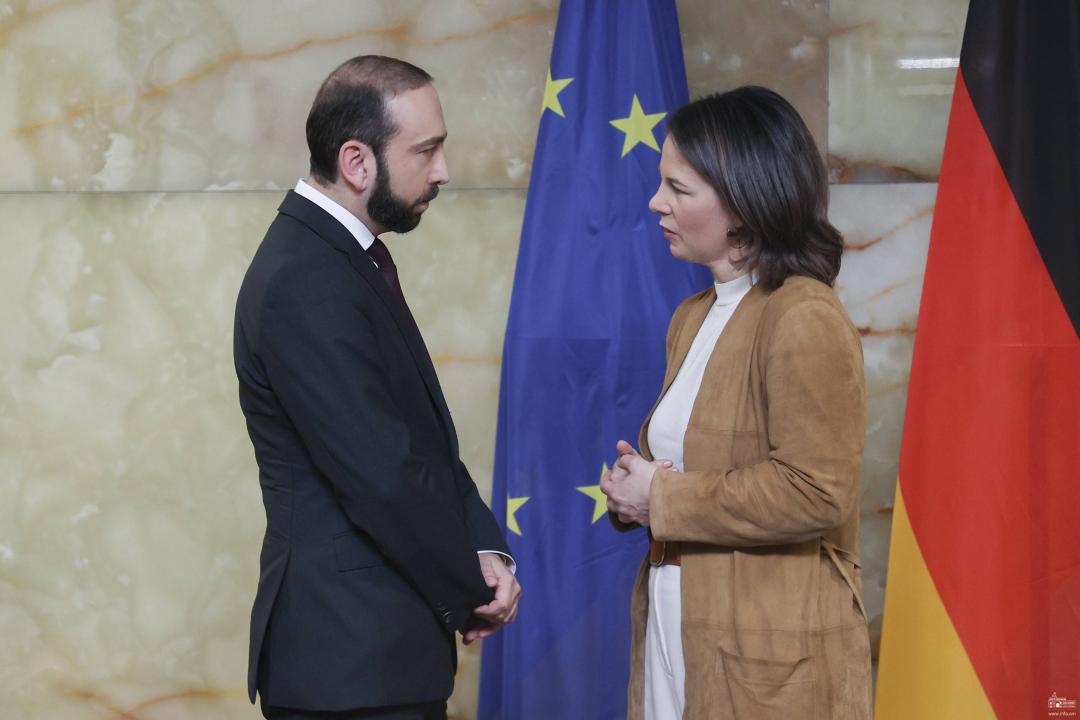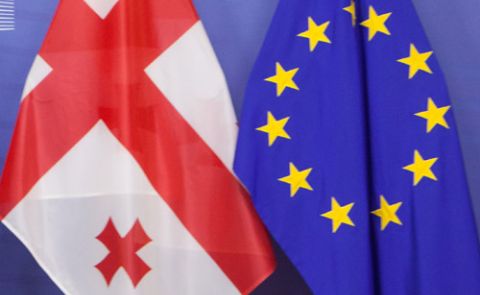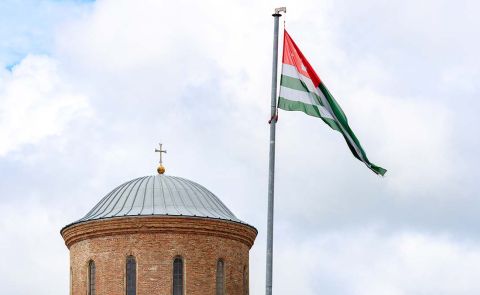
Armenian and German Foreign Ministers Discuss Situation in South Caucasus

Armenian Minister of Foreign Affairs Ararat Mirzoyan and German Minister of Foreign Affairs Annalena Baerbock discussed the situation in South Caucasus in the frames of Mirzoyan’s working visit to Berlin on February 7, the Armenian Foreign Ministry reported.
In his remarks, Minister Mirzoyan particularly commended the Armenia-Germany high-level political dialogue, touched upon the expansion of bilateral cooperation based on democratic values and common perceptions, and highlighted the importance of Germany's support for the large-scale democratic reforms taking place in Armenia.
Speaking about the situation around the Lachin corridor, Mirzoyan noted: “The blockade of the Lachin corridor, as well as many other preceding aggressive actions of Azerbaijan, including the invasion of the sovereign territory of Armenia by Azerbaijani armed forces and the creation of unbearable conditions for life in Nagorno-Karabakh, pursue one goal: to force the Armenian population of Nagorno-Karabakh to leave their homes and thereby depriving them of the right to live in their homeland. One cannot describe this other than a systematic policy of ethnic cleansing.”
The German counterpart Annalena Baerbock attached importance to the results of the quadrilateral meeting between the leaders of Armenia, Azerbaijan, and France and the President of the European Council Charles Michel in Prague, where the sides reaffirmed the 1991 Alma-Ata Declaration, recognizing each other’s territorial integrity. “The Nagorno-Karabakh conflict has existed for over thirty years, and it has led to major disasters. Many lives were lost, and many homes and buildings were destroyed. We know that wounds don’t heal quickly,” the German Foreign Minister said. Referring to the situation around the Lachin corridor, she added: “It’s important that the blockade ends, and we believe that Azerbaijan and Russia must fulfill their obligations here.”
Baerbock also commented on the concerns of the Armenian public that gas supplies from Azerbaijan to Europe cause Baku to be forgiven more than is acceptable for a state governed by the rule of law. Baerbock stressed that Germany and other EU countries are looking for ways to eliminate the energy crisis and reduce the dependence on Russian supplies without ignoring human rights and the principles of the rule of law.
At the press conference, Mirzoyan referred to the Armenian-Turkish relationship as well. He reiterated that there is a dialogue about opening the borders and establishing diplomatic relations.
“I want to reiterate the readiness of Armenia to be sincerely involved in this process and bring it to a logical and positive conclusion as quickly as possible. The process is a little slow, but it is still very positive as we have positive records on the ground. Turkey and Armenia recently decided to lift the ban on air cargo transportation. This is another positive step, and we hope that this process will continue faster and with more tangible achievements,” Mirzoyan concluded.
Mirzoyan Discusses Security Challenges in South Caucasus with German MPs
On February 7, Armenian Foreign Minister Ararat Mirzoyan met with the senior members of the German Bundestag's standing committees on foreign relations, defense, human rights, humanitarian assistance, and EU issues. As reported by the Armenian Foreign Ministry, the members of the Germany-South Caucasus Friendship Group also attended the meeting.
During the discussion, the sides referred to the democratic reforms implemented in Armenia, in the context of which Minister Mirzoyan highlighted the support provided by Germany and the European Union in the Armenian reform agenda.
The participants also discussed the challenges undermining security and stability in the South Caucasus. Mirzoyan presented the details of the humanitarian crisis created in Nagorno Karabakh because of the blockade of the Lachin Corridor. In this regard, the Armenian side highly appreciated the clear messages expected from the members of the Bundestag, including the reopening of the Lachin Corridor and the restoration of free movement.
Minister Mirzoyan updated the meeting participants with the latest developments in the peace process between Armenia and Azerbaijan, noting that Azerbaijan's warlike rhetoric, maximalist ambitions, and aggressive actions undermine Armenia's efforts to establish stability and peace in the South Caucasus.
The parties also addressed several other issues related to the further expansion of the Armenia-EU partnership.
See Also


BP Strengthens Presence in Azerbaijan’s Offshore Energy Sector

Netanyahu’s Letter to Aliyev: Mutual Trust, Solidarity Following Hamas Attacks, Facilitating Dialogue Between Israel and Türkiye

Azerbaijan Expands JF-17 Thunder Fighter Jet Order from 16 to 40 Units

EU Commissioner and NATO PA Warn Georgia Over Democratic Decline Amid Accession Challenges

